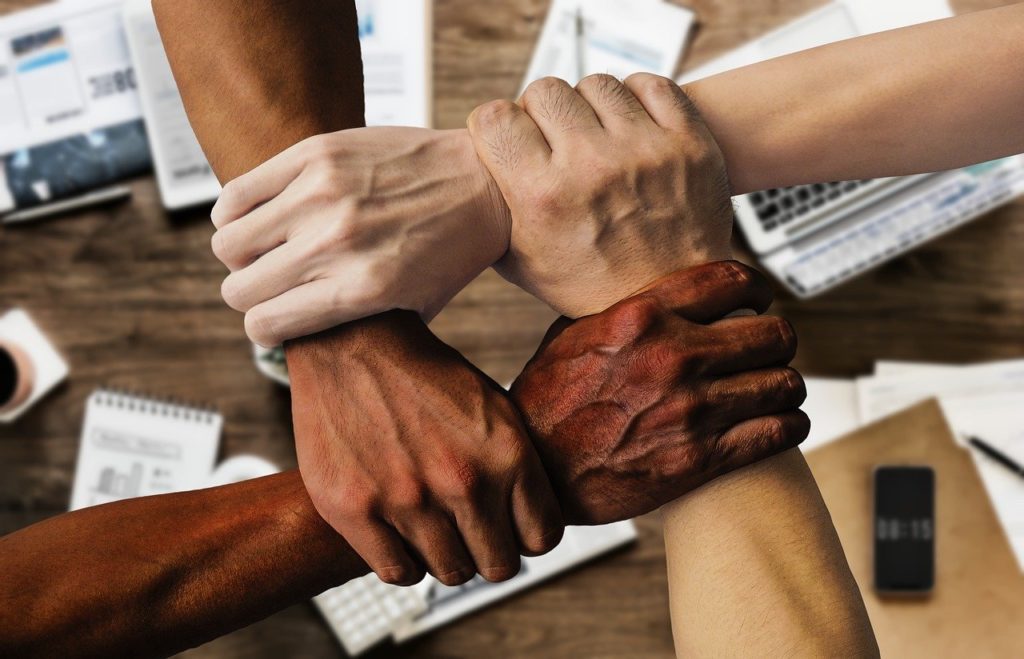A World Divided
Unless you live under a rock, you know how divided this world is. Political and personal arguments and agendas leave you feeling alone. The workplace, whether that’s a building, cruiser, or bunker for you, is easily affected. We need each other now more than ever. We are not meant to go through life alone. You need your team and your team needs you. So how can we build up our teams in a world divided?
Ask anyone who’s been part of a team what the importance of accountability and support are. It doesn’t matter if it’s a sports team, a squad, a crew, or a unit. When you’re on a team, you want your teammates to have your back and you know you need to have theirs.
It doesn’t go well if someone’s sick or doesn’t show. It doesn’t go well if someone isn’t doing their job to the best of their ability. What’s more, it doesn’t go well if team members are arguing or don’t get along. Just as you need your team to take care of their part, you know you need to take care of your part. The best way a team functions is when they support one another despite any shortcomings.
Communication
The most important way to build up your team is communication. Communication is always key! Your teammates won’t know you need help until you either tell them or it’s too late. In first responder life, too late can be more than detrimental; it can be life threatening. It’s critical to be honest about your needs to someone. You may need to be open to someone outside of work to make this happen, but you need to make it happen. People need to hear it from you, both for the sake of knowing the truth and the sake of you being heard.
Communication goes both ways. Be open to hearing from your teammates. Don’t assume someone ditched work out of laziness. Check in! You don’t know what you don’t know. Offer to listen, be patient, and (sometimes) be silent. They may not need your opinion, but they do need your understanding. (There’s no shortage of opinions these days.) If we openly communicate, even if we disagree, we begin to build understanding and that’s valuable on a team.
Check on Each Other
Second, check on each other. This sounds like the first part, and it’s right on its tail, but it goes further. Is someone acting differently? Is someone showing up less often? Does someone have a new mannerism or habit that seems out of character? Pay attention and be curious, not intrusive as that turns people away, but be concerned. Use Level III listening. You never know what someone is willing to disclose when asked. You may find you understand them even better. It’s possible you have the same weight on you and this camaraderie helps you both.
Jessica Hicks, Editor for Thrive, wrote that, “managers who simply say hello and goodbye to their employees each day not only garner more trust, but also keep their teams better engaged.” (February 2020) Is this happening at your workplace? Are you greeting your teammates or saying goodbye or asking about their days off? Think of how you feel when someone takes the time to engage you in this way. It builds trust.
Follow Through
Lastly (in this short blog), follow through. Nothing kills one’s will power like a friend offering support who isn’t really there. Let’s say your team, be it two people or 20, have a good relationship going. You go out together sometimes, know each other’s families, and call off hours. That’s all great. Now you get a call from one person who’s in crisis. It could be debt, family stress, or even suicidal ideation, but you get the call. Now what?
Suffice to say that now isn’t the time to be too busy. Be honest, but realize what you would want if you were in those shoes. Think of how you can help them best. What can you do to alleviate the pain or stress, if only in the moment, that you would need done for you if tables were turned. If this is a small matter, you may be able to put the commitment off, but follow through later. If this is urgent and serious, now is not the time to be silent. Now is the time to speak up and act.
Supporting the Support
Rachel Wilkerson Miller, the author of The Art of Showing Up: How to Be There for Yourself and Your People and a deputy editor of VICE Life, agrees. “People have increasingly turned inward, and that was even before the pandemic, but especially now.”
Mia Brabham, Shondaland, September 2021
First Responders are meant to support the community in which they work and (often) live. They’re here for us on our worst days. Who’s there for them? We need to support our support. We need to give them the resources and tools to support one another either through training, lists of resources, locations, or other tools. It’s vital for department heads and other leaders to step in and provide this support. Yes, the teams need to work together but leadership needs to give them every opportunity to build up their teams.
We are a world divided over so many hot topics, but the same blood runs through all of us and the same brain functions in all our heads. We bleed, we feel, we hurt, and we hope. If we share different opinions and values, that’s fine, but we need to continue valuing each other. We are a team; we are many teams in first responder life (fire, police, military, etc.), but we are all one team.
